Largest Remaining Menomonee Valley Site Will Be Developed
City gained federal funds for 15-acre site. Plus: A recap of week's real estate news.
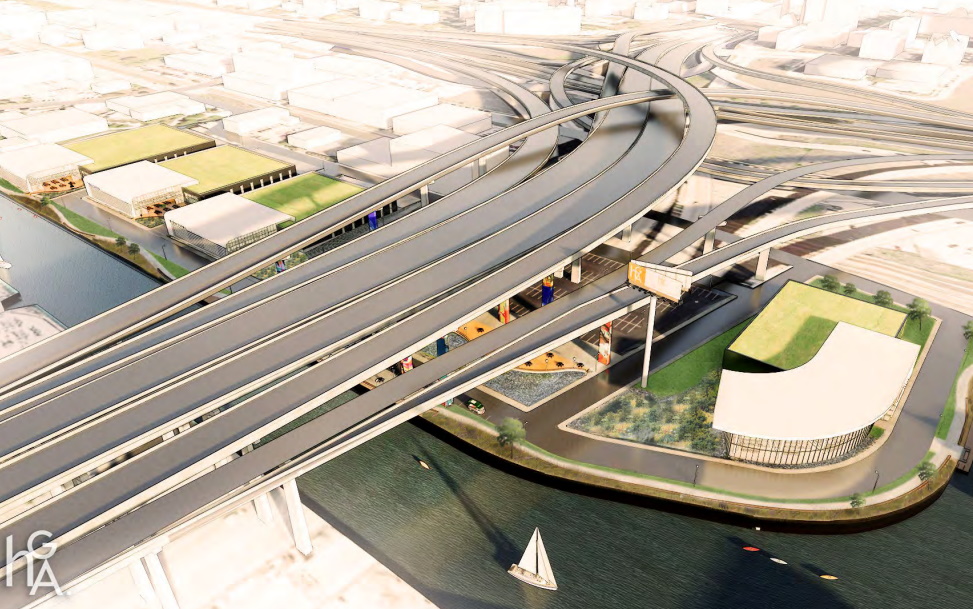
Kneeland Properties conceptual rendering from 2018 Menomonee Valley design charette. Rendering by HGA.
The Department of City Development (DCD) is putting the final pieces of a $4.2 million financing puzzle in place to allow the development of a largely-hidden 15-acre site in the Menomonee Valley.
“There is certainly interest in developing this site,” said Menomonee Valley Partners (MVP) executive director Corey Zetts on Thursday to the board of the Redevelopment Authority of the City of Milwaukee (RACM).
Known as the Kneeland Properties, the site is located between N. 6th St. and N. 13th. and the Canadian Pacific main line and the Menomonee River. The Interstate 94 High-Rise Bridge bisects the property from above as it feeds into the Marquette Interchange.
Zetts said she has received several calls about developing buildings on the property. But the site has a couple of key issues and potential occupants have noticed them.
“Businesses expect to have a road to their site,” said Zetts. They also expect utility infrastructure, like sewer and water lines and electrical service. It has none of that today.
The site was first identified as a development target in the 1998 valley redevelopment plan and a 2015 update labeled it a catalytic site. A 2018 design charette explored the potential development of three buildings and parking under the freeway.
The city and MVP now have a joint plan, and, if the Common Council approves a financing package, it will soon have the funding available to execute it. The result would be 10 acres of developable land.
Zetts said MVP hopes to attract light industrial or food-and-beverage-related tenants that would have public-facing operations, such as a brewery, and could take advantage of a planned riverwalk. “Something that would draw people,” she said of the preferred tenants.
West Mt. Vernon Ave. would be extended east through the site along its northern boundary and the utility infrastructure would be laid along with the extended street. The land would ultimately be sold to private developers.
MVP and DCD have spent the past year putting the pieces together. A surge in funding from the American Rescue Plan Act (ARPA) changed the U.S. Department of Commerce’s Economic Development Administration (EDA) grant program from a 50/50 split, to an 80/20 split, making it more desirable for the city to move. The RACM board authorized applying for the grant in April and in September the city secured a $3.2 million award.
The city is now assembling its 20% matching funding to access the grant.
On Thursday, the RACM board unanimously approved amending the tax incremental financing (TIF) district used to subsidize the development of the Harley-Davidson Museum, 400 W. Canal St., to contribute $1 million to the Kneeland project. A total of $800,000 would be used as a match to access the federal grant. An additional $200,000 would fund costs associated with a land swap with an affiliate of LandWorks, which owns and occupies the site at 1205 W. Mt. Vernon Ave.
DCD project manager Alyssa Remington said a portion of the existing parking lot at the LandWorks property sits on land that is needed to develop the Mt. Vernon Ave. extension. The city and LandWorks would reconfigure their parcels to accommodate the street and create replacement parking spots. The city is also budgeting $200,000 from the TIF district for administration expenses.
The use of an existing TIF district to support development outside of its boundaries creates an unusual situation. Property tax revenue from the Harley-Davidson complex, currently about $375,000 per year, will pay back the $1.2 million in new debt by 2029 according to the project plan. Property tax revenue generated from future occupants of the Kneeland site would immediately flow to the general fund of the city and other property taxing entities.
Without modifying the district, the city would need to begin winding it down as Harley’s $5.7 million subsidy has been almost entirely recovered.
The development site is named for its former owner: 19th-century railroad promoter, businessman and politician James Kneeland.
It is technically three parcels today. There’s the eight-acre 260 N. 12th St. site on the west side, the five-acre 907 W. Hinman St. parcel under the freeway and the two-acre 825 W. Hinman St. on the east. But you won’t find “Hinman St” on a street sign; it was erased with the construction of the Marquette Interchange. The Wisconsin Department of Transportation owns the site under the freeway and RACM owns the other two parcels.
The federal funding comes from EDA’s Coal Communities Commitment (CCC) which received $300 million in ARPA funding. The CCC funding targets cities making the shift away from coal mining or burning. The Kneeland site was used for a period as a coal yard and is across the Menomonee River from the We Energies Valley Power Plant, which was converted in the past decade to burn natural gas instead of coal. It’s historically also been used as a lumber storage site. For a period the city stored towed vehicles on a portion of the site.
The Kneeland development doesn’t mark the end of squeezing every available acre out of the Menomonee Valley. Remington told the RACM board that the city is conceptually exploring options to extend W. Mt. Vernon Ave. west from N. 13th St. to the City Lights Complex and N. 25th St. Most of that corridor is privately-owned, undeveloped land and used for truck parking and equipment storage.
Photos and Site Map
Weekly Recap
Deconstruction Ordinance Again Suspended
The City of Milwaukee continues to keep its deconstruction ordinance deconstructed.
The policy, first adopted in 2018, required old homes to be effectively dissembled instead of mechanically demolished. The vision was to create jobs, protect the environment and save money by selling, not landfilling, old materials.
But it hasn’t worked out, with city officials pointing the finger at one another during a November 2021 meeting.
It’s become an annual process since 2019 for the Common Council to suspend the ordinance for an additional year. The 2023 proposal to do this is pending before the Common Council. Without approval, the deconstruction ordinance would apply to the razing of any home built before 1930.
Local Firm Wants To Buy Northridge From Chinese Owners
The lawsuit over the future of the long-vacant Northridge Mall took a major turn Friday morning.
Milwaukee-based Phoenix Investors has entered into an 11th-hour agreement to purchase the blighted property from the Chinese-based U.S. Black Spruce Enterprise Group.
The City of Milwaukee, following a lengthy lawsuit and hundreds of thousands of dollars in unpaid fines, was prepared to argue its case Friday morning for the property to be seized. But a Thursday afternoon filing by Black Spruce effectively halted that discussion.
Deputy City Attorney Odalo J. Ohiku called it a “delay tactic.”
New Design For Vel R. Phillips Plaza Revealed
Two thumbs up for the revamped plan to replace a downtown surface parking lot with a new park, food and beverage space and future development site.
On Thursday, the Redevelopment Authority of the City of Milwaukee (RACM) unanimously endorsed a $16 million financing plan to develop Vel R. Phillips Plaza at 401 W. Wisconsin Ave.
“It’s really going to be a plaza unlike anything we’ve seen in the city to date,” said Department of City Development economic development specialist Dan Casanova. “It’s a major priority of Mayor Cavalier Johnson in his efforts to create new and improved public spaces throughout the community.”
Located across the street from the convention center, the 30,000-square-foot plaza would include a 2,900-square-foot food or beverage retail space, manicured garden, a flexible space for farmers markets and other events, an informational kiosk, public art installations and a station on Milwaukee County’s Connect bus-rapid transit line. Space would be reserved through the site for a future streetcar line north to Fiserv Forum and Bronzeville.
City Seeks Bids To Demolish Portion of Northridge Mall
The City of Milwaukee is attempting to demonstrate its commitment to cleaning up the vacant Northridge Mall in advance of a pivotal hearing Friday.
“Today, the City of Milwaukee is issuing a public bid to raze the former Boston Store building at Northridge to reduce its liability as the property owner, and demonstrate for nearby residents and businesses that we are doing our part to address this nuisance,” said a city spokesperson in a statement.
The city took ownership of the attached Boston Store building in 2017, but has yet to secure control of the larger mall complex. Since 2019 it has sought to legally pressure the mall’s owners, U.S. Black Spruce Enterprise Group, to fix up or demolish the blighted property. In January it drastically increased its ask, requesting Judge William Sosnay to transfer ownership of the property to the city as a settlement for Sosnay’ contempt order against Black Spruce. The city had previously sought to avoid taking immediate ownership because it did not have the money to demolish the structure and preferred for Black Spruce to complete the court-mandated demolition.
City officials previously estimated the cost to clear the 46.5-acre site and approximately 900,000-square-foot mall at $15 million. The bid request released Wednesday by the Department of Neighborhood Services requests applicants to submit a cost to demolish just the attached, 152,727-square-foot department store, 7700 W. Brown Deer Rd. Responses are due April 13.
MSOE Agrees To Voluntary Tax Payments On New Knapp St. Building
The Milwaukee School of Engineering (MSOE) is agreeing to make voluntary tax payments to the City of Milwaukee as part of a $14 million deal to repurpose an office building into a new home for its Civil and Architectural Engineering and Construction Management (CAECM) programs.
“We really want to grow and expand,” said university president John Y. Walz to the Zoning, Neighborhoods & Development Committee Tuesday. “The demand for our students is outstanding, whether it’s engineering or nursing.” The university reports 2,571 full-time students.
The new building, 310 E. Knapp St., will literally bring the CAECM programs out of the basement. The programs are currently based in the partially-exposed lower level of the university’s campus center, 1025 N. Broadway. Despite the cellar-dwelling location, Walz told the committee that the CAECM programs boast a 100% placement rate.
The university, according to state real estate records, paid $1.09 million for the three-story, 59,429-square-foot building. It acquired the property from real estate developer and MSOE regent Kendall Breunig at a below-market rate.
Parks’ Former Barn Youth Hostel Could Be Redeveloped
Milwaukee County Parks is looking for developers that can redevelop, and reactivate a 1.4-acre site in the Root River Parkway that was once home to the International Youth Hostel.
The 5,180-square-foot barn is still standing, as is a 1,650-square-foot residential building, and parks is looking for someone that can redevelop the site, which has stood vacant for years, as a recreational asset for the community. It sits near the intersection of W. Loomis Rd. and S. Root River Parkway in Greendale.
The department is not contemplating selling the land or the buildings, which it could not do without approval from the Milwaukee County Board. Instead, it wants a developer interested in a partnership with parks, or a lease, that will restore the buildings and bring new uses to the property.
The county has found success in leasing buildings that need maintenance and investment in recent years. The Urban Ecology Center leases and maintains its building in Riverside Park, 1500 Park Pl., as well as its branch in Washington Park, 1859 N. 40th St. And The Boys & Girls Clubs of Greater Milwaukee is planning a multi-million investment in Sherman Park, where it leases a building for the Mary Ryan Boys & Girls Club.
Marcus Scraps Downtown Tower and Movie Theaters
A proposal to develop a 20-story, mixed-use tower and eight-screen movie theater complex in downtown Milwaukee is dead.
Marcus Corp. is selling the 1.23-acre riverfront development site at 1301-1357 N. Edison St. It hired The Barry Company to market the property.
“This is one of the most appealing development properties available in Milwaukee, with an outstanding location and extensive Milwaukee River frontage. We are confident that there will be very strong interest in this site,” said Barry Company president James T. Barry III in a press release.
The asking price is $7 million. The property sits between E. Knapp St. and E. Cherry St., just west of N. Water St.
Council Strongly Supports Northwestern Mutual Deal
Northwestern Mutual‘s $500-million proposal to completely overhaul its aging 18-story North Building and relocate its Franklin-based employees to downtown Milwaukee has strong support on the Common Council, even though the city would need to provide a $30 million subsidy to induce the deal.
“I think this is a home run,” said Alderman Scott Spiker to his colleagues on the Zoning, Neighborhoods & Development Committee.
Council members Michael Murphy and Russell W. Stamper, II also endorsed the proposal.
But the highest praise was offered by area Alderman Robert Bauman.
Ruby’s Bagels Moving To Oklahoma Ave.
Ruby’s Bagels is poised for big growth and a new home. The food truck-based business would buy a vacant, city-owned building for use as a cafe and bakery.
Led by Daniela “Ruby” Varela, the business launched in 2019 and has lived a nomadic existence. Most recently, it’s operated out of a food truck at Zocalo Food Park and a rented commercial kitchen in a church.
The new space, located at 1107 W. Oklahoma Ave., will unify the baking and cafe operations, while providing space for seven-day-a-week operation and growth.
Varela told the Zoning, Neighborhoods & Development Committee Tuesday morning she’s long dreamed of a permanent home. It would offer a place to enjoy Varela’s “great and addicting” bagels fresh out of the oven while also enjoying a coffee.
City Seeks Developers To Build Net-Zero-Energy Homes
Thousands of Milwaukee residents’ next homes could be environmentally friendly, affordable and factory-made under a plan from the city’s Environmental Collaboration Office (ECO) and the nonprofit Community Development Alliance (CDA).
Together they are pursuing a two-home proof of concept in the Lindsay Heights neighborhood.
ECO is offering $500,000 for a development team to construct the houses as a trial for a much larger vision to create a factory capable of producing modular, environmentally-friendly houses. Funded by a federal grant, the effort aims to start with a 1,200-square-foot single-family home and a 2,400-square-foot duplex. Both must be developed using off-site construction techniques and sold to low-income owner-occupants. Solicitation for partners is underway through a request for proposals (RFP).
An additional $325,000 would be awarded to a manufacturer to establish an operation in Milwaukee. In first discussing the concept in 2021, ECO director Erick Shambarger said his office envisions such a facility opening in the Century City business park and serving as a source of new construction jobs and affordable, sustainable housing.
If you think stories like this are important, become a member of Urban Milwaukee and help support real, independent journalism. Plus you get some cool added benefits.
Plats and Parcels
-
New Third Ward Tower Will Be Milwaukee’s Priciest
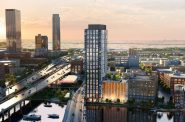 Mar 3rd, 2024 by Jeramey Jannene
Mar 3rd, 2024 by Jeramey Jannene
-
New Corporate Headquarters, 130 Jobs For Downtown
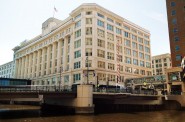 Feb 25th, 2024 by Jeramey Jannene
Feb 25th, 2024 by Jeramey Jannene
-
A Four-Way Preservation Fight Over Wisconsin Avenue
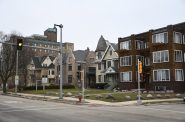 Feb 18th, 2024 by Jeramey Jannene
Feb 18th, 2024 by Jeramey Jannene


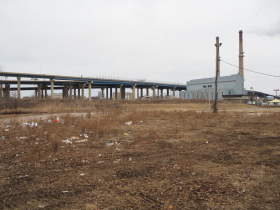
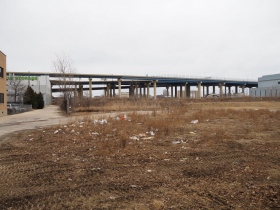
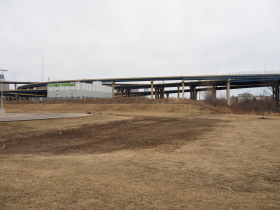
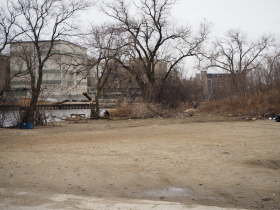
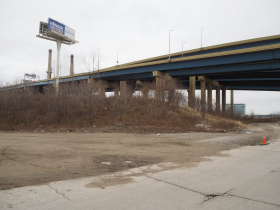
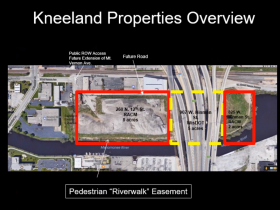




















So a parcel of land named after a railroad promoter and bordering on a rail line is going to be developed without a thought or clue about the opportunities and benefits of rail access.
The entire portion west of the freeway could host industry that imports money by exporting goods made only on sites with rail access (a.k.a. competitive advantage).
“…the city is conceptually exploring options to extend W. Mt. Vernon Ave. west…”
Promote roads but stymie railroads? Sorry, nobody told me.
The entire area under the freeway is doomed to destruction when the freeway needs replacing, but a lot of good use could be had between now and then.